‘Life was getting worse by the day’: Rozi Khal
Rozi Khal was 13 years old when her first-born son, almost a newborn, was injured in the Soviet-Afghan War. The incident sent her packing for Pakistan, and the heaving refugee camp her family would call home for the next 27 years.
“We didn’t have anything. My husband worked as labourer in Queta city doing very tough work which made him sick. Now he can hardly move,” says Rozi Khal, now 45. “We returned to Afghanistan five years ago. Life was getting worse by the day. until Hand in Hand Afghanistan arrived in our village.”
Qaleen Bafan, Afghanistan
Afghanistan’s displacement crisis
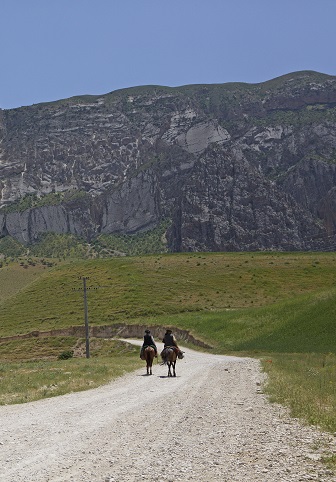 Rozi Khal’s cicumstance is far from unique. Between returning refugees like her and the multitudes of people displaced within Afghanistan by drought and conflict, some 3.5 million Afghans have forced to relocate in recent years – the equivalent, in sheer scale, of the entire population of California being displaced within the US. This in a country with none of the wealth or infrastructure that other countries take for granted.
Rozi Khal’s cicumstance is far from unique. Between returning refugees like her and the multitudes of people displaced within Afghanistan by drought and conflict, some 3.5 million Afghans have forced to relocate in recent years – the equivalent, in sheer scale, of the entire population of California being displaced within the US. This in a country with none of the wealth or infrastructure that other countries take for granted.
In September 2017, Hand in Hand partnered with Deutsche Gesellschaft für Internationale Zusammenarbeit (GIZ), the German government’s development agency, to help displaced Afghans work their way towards a prosperous future in the country’s growing poultry value chain. By summer 2020, we’ll have helped 4,250 of them launch their own sustainable poultry farms.
Afghanistan’s poultry value chain is ideal for returnees and internally displaced people. Skills are easily learned. Incomes, compared to other rural sectors, are high. And for people like Rozi Khal, the benefits don’t end there. Poultry farms can be run from entrepreneurs’ own households – crucial for members with restricted mobility. At the same time, nutrition and food security improve – a matter of particular interest to those responsible for childcare.
A bright future
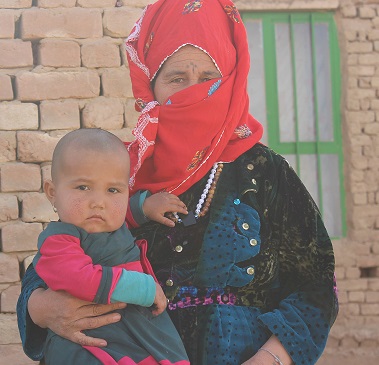
Rozi Khal holds her daughter.
One day, Rozi Khal received a knock at her door. It was a Hand in Hand trainer: would she like to become a member? Rozi Khal joined a Self-Help Group in Qaleen Bafan village, Balkh Province, and received poultry vocational skills training. Next, she built a backyard poultry farm with the support and guidance of her Hand in Hand trainer. “I never had a business idea until I learnt in training that I can have a business in my home,” says the mother of seven. “The poultry enterprise enables me to earn a decent income and help my family.”
With her training complete and chicken coop built, Rozi Khal received 25 chickens, two bags of feed and some other materials she would need to launch her business. Today, she produces 20 eggs a day, earning approximately AFN 2,400 (US $32) a month.
“Now I’m earning more than I used to working in a brickmaking factory, which was very difficult work,” she says. “The training and support I received from Hand in Hand has encouraged me to start the enterprise and now I am confident I will generate a good income.”
As for the future? “I am planning to expand my enterprise within the coming months to increase my brood because there is a good market for eggs,” she says.
By the numbers
Producing 140 eggs a week
Earning AFN 2,400 (US $32) a month
Caring for family of 9
Meet Mahgul, who hatched a plan after her forced relocation
To Mahgul, Pakistan was home. It was where she was born to parents who sought refuge from the Soviet-Afghan War in the late 1980s. It was where she met the man who became her husband and where she gave birth to her first two children.
That all changed nine years ago when the Pakistani government destroyed the refugee camp where she and her family had been living. They were forced over the border to Mahgul’s parents’ homeland, from where the government assumed she had come.
“We didn’t know anything about Afghanistan except that our families were originally from there,” Mahgul said. “We were forced to leave Pakistan and came to Afghanistan, but we didn’t have anything here: no home, no family and no relatives.”
Mahgul and her family were forced to start anew, and now, with help from Hand in Hand, their once-dim future is shining bright. Not only has she settled into her new home in Balkh province, she has learned how to raise chickens, earning an income that has helped support her family.
Balkh Province, Afghanistan
A continuing crisis
Three million people arrived on Europe’s shores hungry and desperate for work during the migrant crisis of 2015-16. Imagine, however, if more than 50 million people had arrived instead, and that Europe was one of the most impoverished places on earth, lacking not only the ability to house those who arrived but also the ability to care for and support them.
That, proportionally, is the problem facing Afghanistan, which has seen millions of people flee their homes over the past three decades because of conflict. More than 2.5 million people are expected to arrive in the country over the next two years from places such as Pakistan and Iran, even as another 1.8 million internally displaced people (IDPs) settle elsewhere in the country to escape intensified conflict.
Establishing a home
Mahgul and her family spent more than a year in Afghanistan living in a tent before they, and other migrants, were taught by the UN Refugee Agency how to build shelter. Mahgul’s husband found work as a shopkeeper, and they settled into their new lives in the village of Mahajir Qeshlaq, in the Sholgara district of Balkh province.
But for Mahgul, now 30, the desire to continue to make a better future for her family remained strong. Last year, she learned about Hand in Hand Afghanistan and, excited by the prospect of earning an income, joined the programme to learn the basics of poultry farming.
Over five days, Mahgul learned not only how to properly raise and care for chickens, but also how to run and develop a business and manage her finances. At the end of her training, she received her own chickens, as well as feed and a number of tools, as part of an enterprise start-up kit designed to help her succeed.
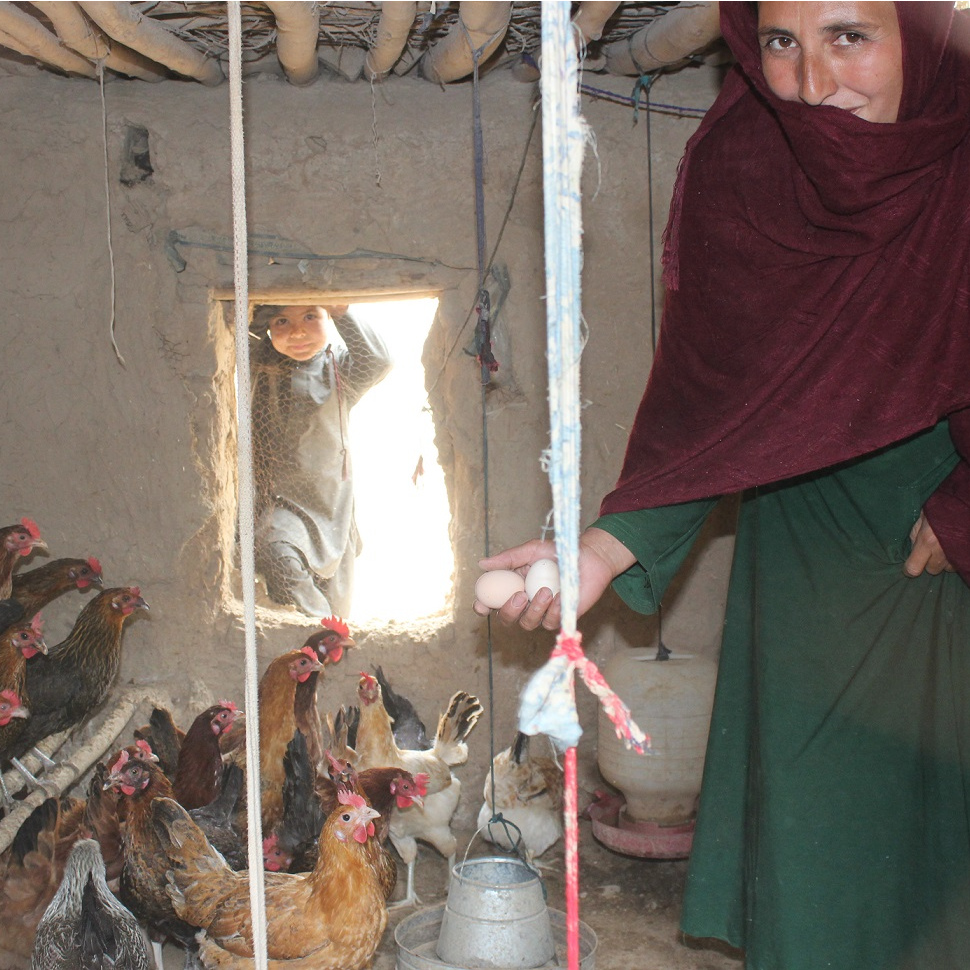
Forging a future
Not even a year into her new endeavour, Mahgul’s farm has grown to include 32 chickens that produce an average of 20 eggs each day. Though some are kept to help feed her family, she sells most of them, earning a monthly income of nearly 3,000 AFN (US $40).
That income has not only helped her support her family, but it has also allowed her to help put her children through school.
Less than a decade ago, Mahgul was left helpless as she and her family were forcibly deported from her home. Now, she has not only been empowered to forge her own future, but she has cultivated one for her children as well.
Mahgul’s results
Settled after forced relocation to Afghanistan
Increased monthly income from 0 to 3,000 AFN (US $40)
Able to contribute to school fees for her children
Meet Frozan, who has created a buzz around Marmul
Frozan, 18, lives in north Afghanistan, a corner of the world where opportunity is scarce. Still, that never stopped her from dreaming. “We are a big family and my father, a farmer, was the only one earning – it was never enough. I have always wanted to do something to help but I didn’t know how.”
Didn’t, that is, until she met Hand in Hand. Frozan joined a Self-Help Group and quickly became a star pupil. Training led to a business plan, which led to a loan from fellow group members. Finally, she was ready: the newest and youngest beekeeper in her village. Her business has not only helped put her through school, but it has done the same for her younger siblings and even helped her parents provide for the family.
Mazar-i-Sharif, Balkh Province, Afghanistan
Keeping busy
As a student, Frozan had already achieved more than her peers, but a desire to help her family would not let her stop there.
After joining the Shogufa SHG, Frozan attended regular meetings and supplemented her schoolwork with training on microfinance, bookkeeping and business development.
“I was keen to have a business from the first group meeting until I completed [business development] training, when I understood how to run a business and what I should consider before starting a business,” Frozan said. “Therefore, with the help of my trainer, I developed a business plan.”
Frozan carried out a study of the Marmul district in the Balkh province in northern Afghanistan and learnt that there was a high demand for honey. After further research, she discovered that beekeeping doesn’t require much labour – a perfect arrangement for a full-time student – and so she applied for and obtained a microloan of 10,000 afghanis (US $140) so that she could purchase two boxes of bees.
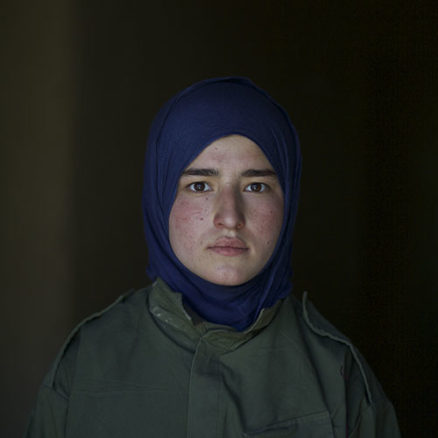
Sweet success
As the youngest person in Marmul to keep bees, the SHG taught Frozan the skills she needed to look after them, as well as how to extract the honey and improve its quality and volume.
After her first year, she had harvested 16 kg (35 lbs) of honey, making enough to not only repay the microloan but to leave her with a small profit. She invested that back into her business by buying more bees, and last year, she earned 120,000 afghanis ($1,728) from the 120 kg (265 lbs) of honey produced by a collection of what had grown to 20 beehives.
“After first year of my business, I was amazed to see the results,” Frozan said. “I repaid the loan and expanded my business. Now I am paying school expenses of my two younger siblings, helping my dad in home expenses and I have my own savings for emergencies.”
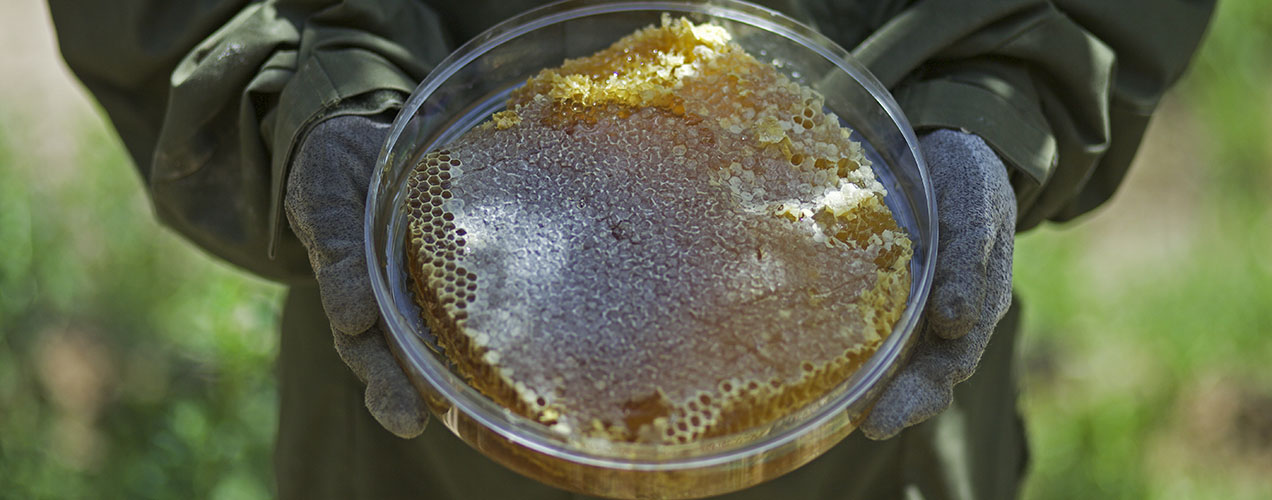
Frozan’s classmates have told her they have been inspired by her business and that they would like to set up their own.
“People having a business like me can help their families to overcome financial challenges, save for emergencies and take active part in developing economy of their communities,” she said.
“Now I have learnt how to manage my activities and time, and work confidently in order to improve our lives. I am also saving for expanding my business, which will in turn generate more income for me in the future.”
Frozan’s results
Increased monthly income from 0 to 10,000 AFN (US $144)
Able to contribute to school fees for her siblings
Inspired classmates to create their own businesses
Meet Cecily, whose vertical farm has taken flight
Fifteen square meters isn’t just the size of Cecily Wawira’s rented smallholder farm. For years, it was the boundary imposed on her ambitions. But after learning an innovative growing technique called ‘vertical farming’ from a Hand in Hand Self-Help Group – along with the basics of entrepreneurship – things are looking, well, up.
“Many people here are down economically,” says the 44-year-old grandmother from Embu County, Kenya. “If they can be empowered and lifted up the same way we have, they too can become active and do things the way we are doing them now.”
Embu County, Kenya
Making ends meet
Life is changing rapidly in urbanising Embu County, home to more than 500,000 people. According to the Kenya National Bureau of Statistics, 28.2 percent of residents live below the poverty line, which the World Bank classifies as earning less than US $1.90 a day.
For those still working as smallholder farmers, life can especially hard. Problems affecting farming in this arid region range from an unpredictable climate and scarcity of water to, for thousands like Cecily, a simple lack of land.
Maximising growth
For much of her life, Cecily was a casual labourer who struggled to make enough money to purchase even basic necessities.
She rarely made more than KES 250 (US $2.50), which made it difficult for her and her husband to provide not only for themselves, but also for their two children.
“If I wanted to eat an egg or vegetables or meat, I went asking for a loan in the shop,” Cecily said.
Her fortunes changed early last year, when she learned about the Mathayo Women Self-Help Group.
With generous support from the IKEA Foundation, Hand in Hand trainers led regular morning meetings in which the women were taught the fundamentals of running their own business.
“I listened to them and I heard they had good things to say, such as the importance of having savings to improve my life and how I will benefit,” Cecily said.
That rekindled her interest in farming, but because of a lack of land, she had to be creative. With the support of the Self-Help Group, Cecily learned how to set up a vertical farm – a series of outdoor shelves holding bags of soil where vegetables grow – to maximise her limited space.
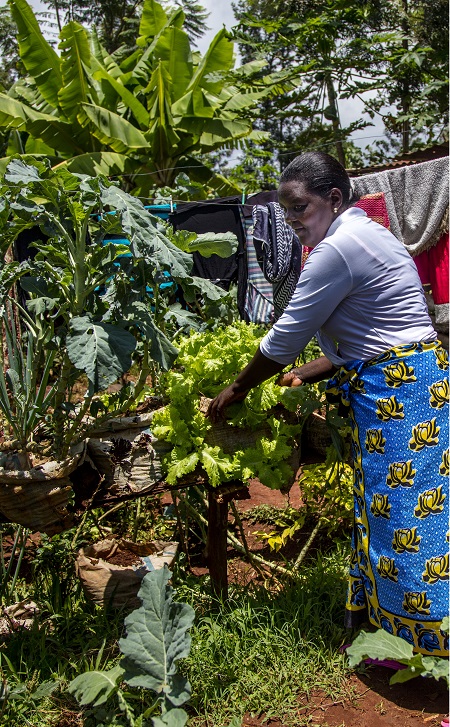
“Because here land is small, I see it’s important to plant that way,” Cecily said. “Now I benefit by eating the vegetables – spinach, kale and amaranth – and there are others I sell.”
Spreading her wings
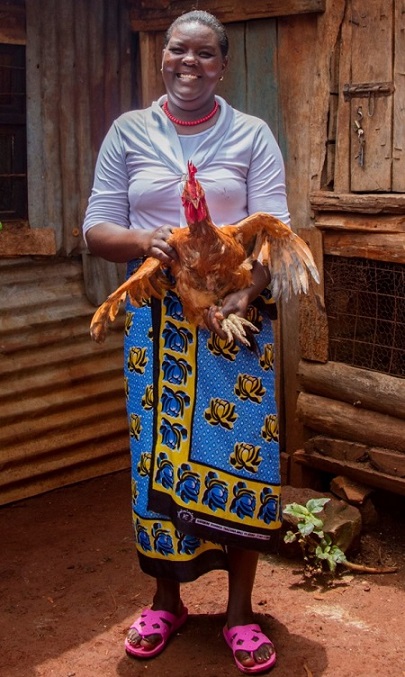
IKEA Foundation projects Embu run by Hand in Hand East Africa.
Cecily’s calculations were correct. She was soon able to sell her vegetables, keeping some of the profit as an income and reinvesting the rest. She then began retailing bananas, which she sold for a weekly profit of KES 2,000 (US $20).
Within time, the profits from the vegetable farm and the bananas helped her dream grow bigger. Now, Cecily raises chickens and sells eggs for KES 25 (US $0.25) each. She even uses the manure as a fertiliser for the soil in which she grows the vegetables.
“The biggest difference is that I am very busy doing a lot of things and I am making good money,” she said.
Each day, Cecily aims to put aside a portion of her profit for her savings. She has been able to help her children, aged 24 and 22 with children of their own, to support their families. She has also noticed her neighbours have set up their own vertical farms.
And, with the money she has earned from her growing business, she and her husband have a new financial goal.
“Eventually I want to build my own house so I can improve my life,” Cecily said.
Cecily’s results
Set up her own farming business
Reinvested profits in order to expand
Set goal to one day own home and land
Meet Zubaida, the ‘famous’ tailor from Marmul district
Four years ago, Zubaida had no job and no income. Today, she’s something of a local celebrity, “famous” for running her own tailoring business. With her newfound income, the 32-year-old is feeding her children a more nutritional diet. And with her growing reputation, she’s training six people in her community to work as tailors, just like her.
The Gul Lala Self-Help Group
Employment in Afghanistan is hard to come by. Poverty is not. Some 39 percent of Afghans live on less than US $1.90 a day, the World Bank’s threshold for ‘extreme poverty’.
Zubaida used to be one of them. Back in 2014, she was struggling to feed her five children with her family’s monthly income of AFN 7,000 (US $100). So when Hand in Hand Afghanistan offered her the chance to learn business skills as part of a Self-Help Group, she leapt at the chance.
Hand in Hand’s budding entrepreneurs are offered the chance to learn basic business skills, form a community and build a pool of savings that can be used to take their initiatives further. Zubaida joined the Gul Lala Self-Help Group and did exactly that, taking an initial loan of AFN 10,000 (US $200) to establish her own tailoring business after gaining the training and confidence she needed.
Entrepreneurial pursuits
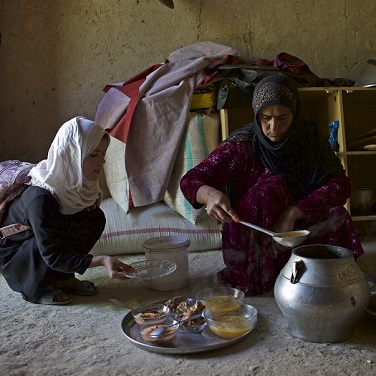
Zubaida serves her daughter lunch
Today, Zubaida designs, makes and sells women’s clothes for AFN 200 to 450 (US $3 to $7) an item, while the clothes she makes for children fetch AFN 150 to 200 (US $2 to $3). Between them, she earns about AFN 6,000 (US $85) a month.
But the impact of her new enterprise isn’t only financial. “Now I’m able to make decisions about my kids and describe my views and opinions in a better way with my family members,” she says.
And her sense of empowerment doesn’t stop there. “My neighbours and relatives see me as a businessperson and as an instructor, which makes me proud,” says Zubaida. “My enterprise has made me famous and it has given me the courage to take part in social activities.”
Having paid her loan back to the group, she is now training six people like her in tailoring entrepreneurship. Not only has her business allowed her to build financial freedom and confidence, it has given her a platform to train and inspire others to improve their own lives.
Zubaida’s results
Monthly income: AFN 6,000 (US $100)
Training six members of her community
Feeding her five children healthier meals
Meet Mageswari, the toy shop owner bringing joy to Pondicherry’s children
By Shivani Kochhar
Mageswari, a toymaker’s daughter, had always dreamed about owning a toy shop. But with no secondary school education and few assets to her name, her dream was destined to never become reality.
That’s life in India, where two out of three working households earn less than 1,000 INR (US $15) per month. Mageswari’s was one of them. She also had a son to worry about.
It runs in the family
Inspiration struck Mageswari’s brother: they could team up to open a toy shop together and sell their father’s hand-carved wooden toys. After all, in business two heads are better than one. But Mageswari’s brother also lacked a credit history or assets, and even microfinance lenders would not consider giving them a loan.
Pondicherry, India
A helping hand
That’s when Mageswari heard about Hand in Hand. The 40-year-old joined a Self-Help Group five years ago with the intention of securing a loan to bring their business idea to fruition. After completing her training, she pooled what little savings she had with a microloan from Hand in Hand India, bought the necessary equipment and rented a shop in the centre of Pondicherry.
The dream team
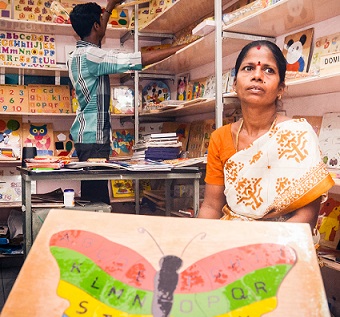 The toyshop was a huge success, reaching a monthly turnover of 57,000 INR (US $880). Brother and sister employ four of fellow Self-Help Group members, spreading their success around the community. “Other toy shops in Pondicherry only sell plastic toys – they are cheaper than our wooden toys but they also last less long,” says the soft-spoken but self-assured Mageswari. These toys leave a legacy.
The toyshop was a huge success, reaching a monthly turnover of 57,000 INR (US $880). Brother and sister employ four of fellow Self-Help Group members, spreading their success around the community. “Other toy shops in Pondicherry only sell plastic toys – they are cheaper than our wooden toys but they also last less long,” says the soft-spoken but self-assured Mageswari. These toys leave a legacy.
Mageswari’s brother, a born entrepreneur, took the initiative to reach out to local schools using a mail marketing campaign and the local press. The schools now place large orders for their toys. “I couldn’t have done this without Hand in Hand’s training and support,” he says. The siblings have even expanded the product range to include specialist Montessori toys.
A fairytale ending
Today, Mageswari has a degree of financial independence she could never have dreamt of before, along with a television and refrigerator to prove it. Most importantly, she can pay for her son’s college education. Before the toy shop, annual fees of 75,000 INR (US$1,166) made college unthinkable. Today, her son is in his second year of electrical engineering.
“We plan to expand our business by buying our own premises and additional machinery,” says Mageswari. Watch this space: maybe one day this brother-sister act will build their own toy shop empire.
Mageswari’s results
Toy shop earns 57,000 INR (US $880) a month
Able to put her son through college
Employs 4 staff from the community
Meet Manimozhi, grinding away for her family’s future
By Shivani Kochhar
With a grandchild on the way, Manimozhi needed funds fast. Her family business, a flour mill, was failing. But without capital and expertise she couldn’t change her fortunes.
A new family member
Manimozhi wanted to give her grandson the best start in life; in Pondicherry, this means being born in a private hospital. Only 1.2 percent of Indian gross domestic product is spent on public healthcare, and many government hospitals lack basic standards of hygiene, particularly in rural areas. For people like Manimozhi, they are an absolute last resort.
Pondicherry, India
Becoming a businesswoman
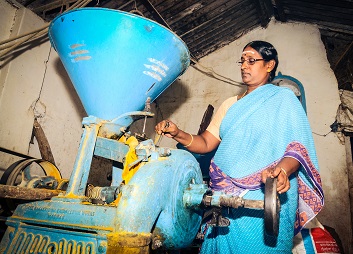 Manimozhi joined a Hand in Hand Self-Help Group with the hopes of using her loan to pay for the costs of the birth. Instead, after receiving training in financial literacy, she ploughed the loan into the faltering mill business she’d inherited from her father and paid for the birth using pure profit.
Manimozhi joined a Hand in Hand Self-Help Group with the hopes of using her loan to pay for the costs of the birth. Instead, after receiving training in financial literacy, she ploughed the loan into the faltering mill business she’d inherited from her father and paid for the birth using pure profit.
Manimozhi’s mill grinds rice, wheat and grains into flour or oil. It’s bring your own grain: customers are only charged for the grinding service. Using her loan, Manimozhi modernised the mill with an automated elevator that feeds paddy into the mill more quickly, speeding up production. Now, customers travel for 30 minutes by tractor to come to the mill. “I’ve opened my own private bank account so I can save better,” she says.
Keep calm and carry on
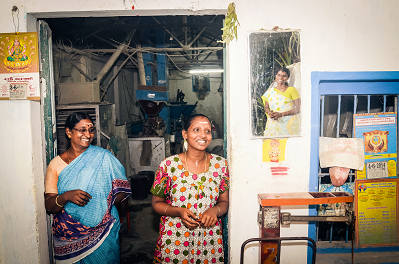
Those savings came in handy when the mill was damaged, its roof torn clean off, during a severe statewide storm that killed almost 50 people in Pondicherry and nearby Tamil Nadu. The cost of rebuilding was IRN 50,000 INR (US$ 766). With her savings in store, Manimozhi wasn’t held back: she got on with the rebuild quietly.
Manimozhi’s is now the longest standing flour mill in the area. The business has been in the family for 55 years and is already providing for two more generations. She now knows how to support her family through the good times and the bad.
Manimozhi’s results
Employs 4 staff members
Pays for grandchildren’s education
Supports 3 generations of her family
Meet Komala, who’s bringing beauty back into business
By Shivani Kochhar
Running her own beauty salon had been a dream of Komala’s since childhood, but lacking education and in her mid-30s, she was a housewife living on the brink of poverty instead.
The ugly truth
In India, one in five people are considered ‘poor’, living on less than $1.90 a day. This is partly due to the nature of employment: only 17 percent of jobs are salaried and one-third are irregular. Women looking for work have even more hurdles to overcome as there is large gender gap in the workforce. Just 27 percent of women participate in the labour force at all, compared to 79.1 percent of men. Clearly, the odds were against Komala – so she decided to take matters into her own hands.
Transformation
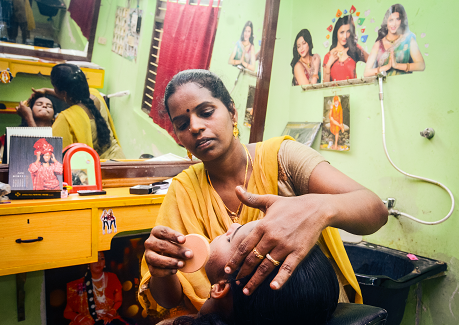
Things changed for Komala when Hand in Hand arrived in her panchayat. Inspired by her Self-Help Group’s promise of beautician training, not to mention a loan to get her started, she soon finished her training and opened up shop. With four beauty salons nearby already, she established a competitive advantage based on comparatively low prices and superior customer service. She is especially busy during wedding season when everyone needs to be pampered to perfection.
“Some of my neighbours have been motivated to start up a business of their own,” she says.
A touch of sparkle
Even with business humming, Komala found she had downtime during the day. That’s when she established a side-business embellishing saris with sequins and embroidery that now accounts for 30 percent of her income. But she wasn’t done there. Sensing opportunity, Komala qualified to become a beauty trainer herself, and today teaches up to 20 students a month. She earns INR 1,000 (US $15) per student and gets the satisfaction of helping other women start their careers. “Even though I am training members of my community, they see me as a professional,” says Komala.
Pondicherry, India
Looking forward
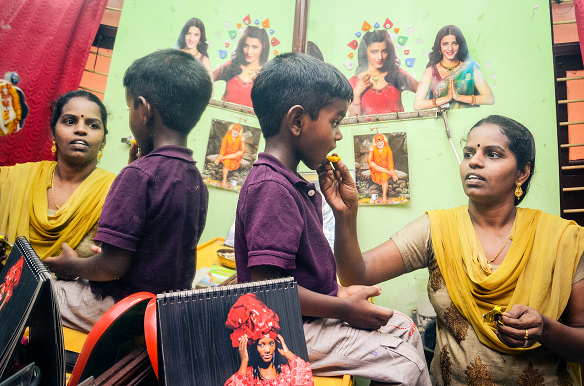
Together, her three streams of income bring in an average of INR 51,600 (US $770) a month. That’s enough to pay for life-changing appliances including a refrigerator and air conditioner. She can also afford some luxuries such as a TV. Next up: Komala is saving to buy a permanent home for her family and, when they grow up, pay for her two children’s university. “I hope that my son will become a doctor,” she says.
And her plans for her business? “I want to brand my salon with my own name, to make it stand out from others in the neighbourhood.” Sounds like a winning idea to us.
Komala’s results
![]()
Earns INR 51,600 (US $770) a month
![]()
Able to give her children a university education
![]()
Helps the community by teaching her skills to budding beauticians
Meet Jagadeeswari, the spice-seller with SME status
By Shivani Kochhar
Jagadeeswari could give any entrepreneur a run for their money. Five years ago, she was distributing her spices as free samples to neighbours and her business was making a loss. Fast-forward to today and she has won a state prize for ‘First-Generation SME Entrepreneur of the Year’. Her distribution network spans 200 shops across her home state of Tamil Nadu, and she sends her spices as far away as Malaysia. It’s a homegrown business gone global, and an unlikely success story in a state where 22.5 percent of people live below the poverty line, earning less than US $1.90 a day. Jagadeeswari’s successes are an exception to the rule rather than the norm – something that Hand in Hand aims to change.
Pondicherry, India
The perfect blend
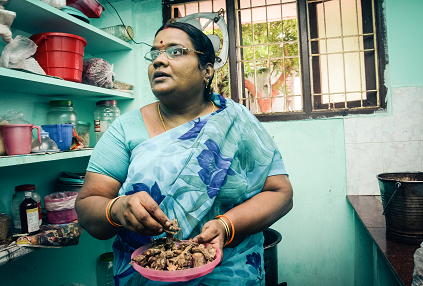
Jagadeeswari flourished at her Hand in Hand Self-Help Group. The energetic 46-year-old is a natural leader, and her fellow group members quickly selected her to be in charge. Jagadeeswari started selling her spices at food fairs and managed to grow her client base district-by-district until she had established a state-wide network. Recognising her potential, Jagadeeswari’s Hand in Hand trainer provided her with special training in bookkeeping and packaging.
“Joining the Self-Help Group changed my life totally,” says Jagadeeswari, who now produces a range of around 40 all-natural spices and food products. She is the only producer in town with such a wide range of condiments.
Sugar and spice
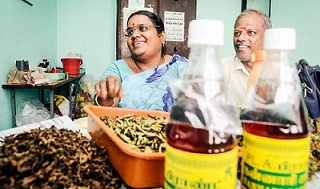 Jagadeeswari wanted to increase her product range and hit a winner: Sarpath. A refreshing all-natural sweet soda, it’s perfect for washing down all those spices. Now she earns 35,000 INR (US$ 525) every month in pure profit. She also employs five staff including her husband, who helps with marketing and sales. He’s pleased for Jagadeeswari: “I’m very happy about my wife’s success.”
Jagadeeswari wanted to increase her product range and hit a winner: Sarpath. A refreshing all-natural sweet soda, it’s perfect for washing down all those spices. Now she earns 35,000 INR (US$ 525) every month in pure profit. She also employs five staff including her husband, who helps with marketing and sales. He’s pleased for Jagadeeswari: “I’m very happy about my wife’s success.”
Woman power
As business is booming, Jagadeeswari has bought a separate building for her work and invested in a packing machine. Besides her husband, all her employees were formerly housewives and members of her Self-Help Group. Most importantly, the income generated from her spice business finances her son’s architectural training. Investing in her son’s education has already paid off – he helps her to do her marketing and created a website for the business. Jagadeeswari‘s children now call her “mother role model”. She’s their inspiration.
As for her Entrepreneur of the Year award, Jagadeeswari says she’s happy for the publicity – as long as it attracts new clients. Clearly, she never stops being the businesswoman.
Jagadeeswari’s results
Earns 35,000 INR (US$ 525) net profit per month
Sends her son to architectural school
Achieved SME level status
Meet Savitah from Kanchipuram, who’s gone from paper dreams to paper plates
By Shivani Kochhar
Savitah’s paper-plate business was making no profit at all. The 26-year-old newlywed had little experience of business. But she did have a drive to succeed.
A woman on a mission
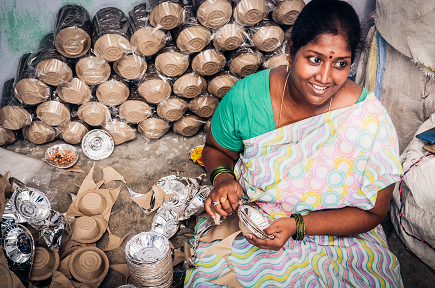
Savitah was inspired by her friends in Bangalore to go into business. Most of all, she admired the bravery of these female entrepreneurs for breaking the status quo: just 27 percent of women participate in the labour force at all, compared to 79 percent of men. Savitah initially attended a Self-Help Group to finance a paper-plate-making machine. One thing led to another: she completed bookkeeping training and realised that 85 percent of her total costs went on raw materials, preventing her from making a profit.
Savitah put every effort into sourcing cheap materials, knowing they could make or break her business, searching as far afield as Delhi (2,200 km away). In the end, she managed to find a supplier much closer to home in Chennai.
The secret to success
Today Savitah consistently undercuts her competitors – and watches her sales soar. With her savvy sourcing, she maintains a healthy 27 percent profit margin. This is boosted by the sale of off-cuts to paper merchants who use them to make recycled paper. It’s business-smart and environmentally sustainable. Her monthly net income, once zero, is now 21,500 rupees (US $350).
Kanchipuram, Tamil Nadu
Independent woman
Most of Savitah’s income has been reinvested in the business, but she keeps a little for herself so she can feel more independent in her daily life. “When I leave the house now, I don’t need to ask my husband for money,” she says.
Her husband questioned the need to buy a second machine but Savitah’s reasoning was as simple as it was compelling: “Anyone who buys a paper bowl will also need a paper plate, so let’s buy that machine, too.” Although she’s an entrepreneur at heart, Savitah says, “Before joining the Hand in Hand group, I would not have been confident to make a decision like that on my own.”
Team leader
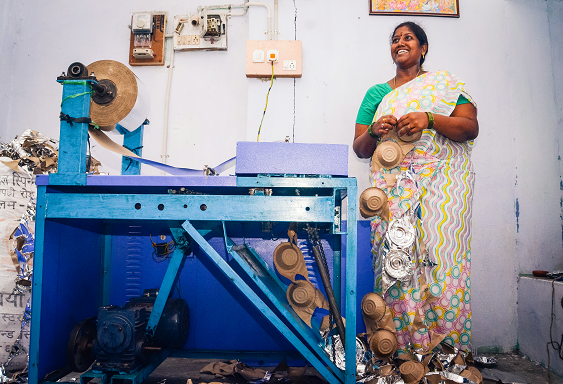
Savitah exudes a quiet confidence and determination, and since she first joined the group she’s persuaded five new members to join. Her peers chose her as their group leader, a role that entails managing meetings, teaching basic business skills and encouraging members to start their own businesses. A fast learner herself, she observes: “Sometimes it takes members so long to get up to speed with the concept; you have to be patient until they understand the approach.”
A working mum
Now 31, Savitah is expecting her first child but is confident that she will continue on her path as an entrepreneur and group leader. “I enjoy being independent and helping others to be independent, too,” she says.
Savitah’s results
Earns 21,500INR (US$ 350) net income per month
Voted to be the leader of her Self-Help group
Has financial independence
